Hey folks, Ambush Bug with a very cool interview with the Original Live Action Doctor Strange, Peter Hooten. Longtime AICN reader and journalist, Mark Edlitz tracked down the original doctor and was able to chat with him. Here is the fantastically fun interview below!
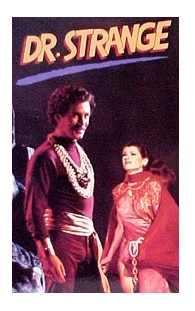
On November 4th the Marvel Cinematic Universe will get a little stranger when Benedict Cumberbatch stars as Stephen Strange in the new superhero flick DOCTOR STRANGE. But Cumberbatch isn’t the first actor to play the surgeon who must learn the secrets of sorcery and black magic in order to fight the forces of evil. Peter Hooten played the titular hero in the 1978 TV movie DR. STRANGE for CBS.
The network, which was enjoying the success of THE AMAZING SPIDER-MAN with Nicholas Hammond as the web-slinger and THE INCREDIBLE HULK starring Bill Bixby and Lou Ferrigno, was looking to expand its already impressive superhero line-up. So, they hired Philip DeGuere, who would go on to serve as the executive producer of the mid-1980s reboot of THE TWILIGHT ZONE, to write and direct DR. STRANGE. If successful, the movie would also serve as the first episode for a new series.
In the movie, a wise old sorcerer must pass along his ancient powers to the psychiatric resident Stephen Strange before the Queen of the Sorcerers Morgan Le Fay can kill him. Jessica Walter, who is best known as the overbearing matriarch Lucille Bluth on the hit cult series ARRESTED DEVELOPMENT, starred as the sexy enchantress. Le Fay can’t quite decide if she wants to destroy Strange or go to bed with him.
In the comics and in the upcoming Marvel Studios’ release Strange is a brilliant but arrogant surgeon. However, in the TV movie he’s a compassionate psychiatrist who is described by a colleague as the “only one who gives a damn.” Sure, Strange is a bit of a cad who enjoys his bachelor lifestyle and beds three, no, four nurses in just one month, but according to his wizard-mentor, he’s also an “usual man” who has been “gifted with a clear mind and a love for humanity.” More remarkably he already possesses “latent talents” and “powers” that will enable to him to “take the fundamental forces of the universe and direct them, control them at will.” In the end, Strange resists Le Fay’s advances, travels to other dimensions, battles demons, and eventually accepts his “destiny,” as a “Sorcerers apprentice,” which requires him to begin the perilous adventure of learning to understand and control his new awesome powers. Despite the creative team’s efforts to take Steve Ditko and Stan Lee’s brainchild seriously, the nearly ninety-four minute movie failed to deliver the kind of ratings needed to justify the expense of producing a special-effects-driven show on a weekly basis. The film is not an overlooked masterpiece, but taken as the first live-action adaption of a Stephen Strange story it is an interesting curio.
In this interview, which was conducted by phone and in writing and has been edited for clarity, Hooten looks back at his time as Master of the Mystic Arts and shares his thoughts about the upcoming Marvel movie.
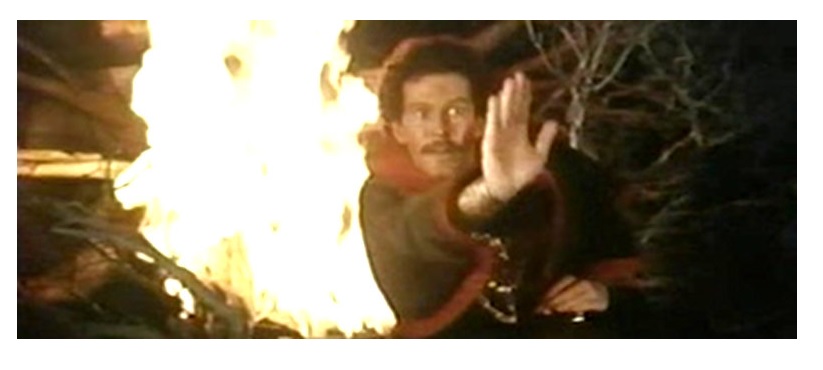
MARK EDLITZ (ME): Thank you for taking the time to talk to me.
PETER HOOTEN (PH): It’s very embarrassing in a way. It’s half a life ago.
ME: A lot has changed since your tenure as Stephen Strange. Today superheroes are a billion-dollar business whereas in the Seventies a stigma was attached to acting in a comic book property. Did you have any reluctance to playing a superhero?
PH: No. Ever since I was a child there was always Superman or Might Mouse. There was Super Woman or the Fifteen Thousand [Laughs] -- I mean Million Dollar Man. But there have always been superheroes. CAPTAIN AMERICA[staring Red Brown as the Star-Spangled Avenger] was being filmed on a nearby soundstage. SUPERMAN came out around the same time, and that was the first real big superhero splash. WONDER WOMAN was also on the air. There had also been BATMAN in the Sixties. It was a primitive version but it had all the elements – the costumes, the car and Catwoman. So DR. STRANGE was neat and there was a chance that it would go to series. [Hooten assumes a spooky sounding voice] Doctor Strange, the Master of the Mystic Arts. [Laughs]
ME: How familiar were you with the comics?
PH: For preparation, I combed every comic shop. I collected the comics. I read them and immersed myself in them. I read them not only to see what was going on but also to learn what his body language was like. Comics are also a great storyboard.
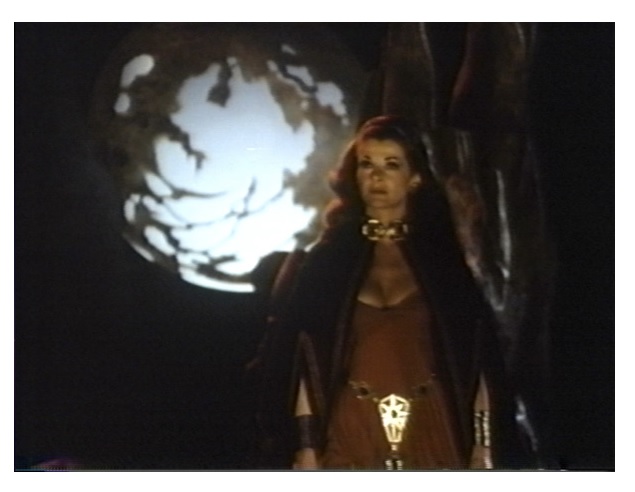
ME: Tell me about wearing the costume.
PH: The superhero costume these days is usually as snug as a body glove. I suppose the “Crotch Watch” chose a looser tunic [than the form-fitting outfits that Spider-Man and Captain America wear]. When I put on the costume I was very grateful that I didn’t have to go to the gym and fill it out anymore. It was kind of a tunic. But when you look into the mirror and your costume is on right, that’s a big part of getting into the character. You just hope to bloom forward into the character. As you go scene by scene it always gives you a clue – like a crossword puzzle – about how you’re going to fill out that part of the script. It always turns out differently but at least you’re giving yourself to it.
ME: Do you remember the first time you put on the costume and how that felt?
PH: The first time I put it on for the film was for the scene with John Mills where he faints and I pick him up and carry him off. You can’t help but feel, “Okay, I’m wearing a cape so I can be a little bit regal.” One just gets into it. It’s the, “what if” aspect of the art. The “what if this happened?” The fun feeling of playing with the power. What if that politician’s wig turned a different color? If I can do that trick and think myself out of a jam. And discovering new powers. I was thinking about all those things.<br
When you’re acting in front of a green screen you have to imagine so much. That must really be a challenge. I remember it vaguely for Dr. Strange. I was flying and there was this screen and God knows what they were going to add to it. Maybe electrical currents coming out of my fingers -- I didn’t know. It would be exhilarating to feel all those things. And amusing. What if you could do all of those things? Your imagination would be thriving. But one doesn’t delude oneself. You’re just acting.
ME: Sure, but I think anyone who has ever put on a superhero t-shirt can relate.
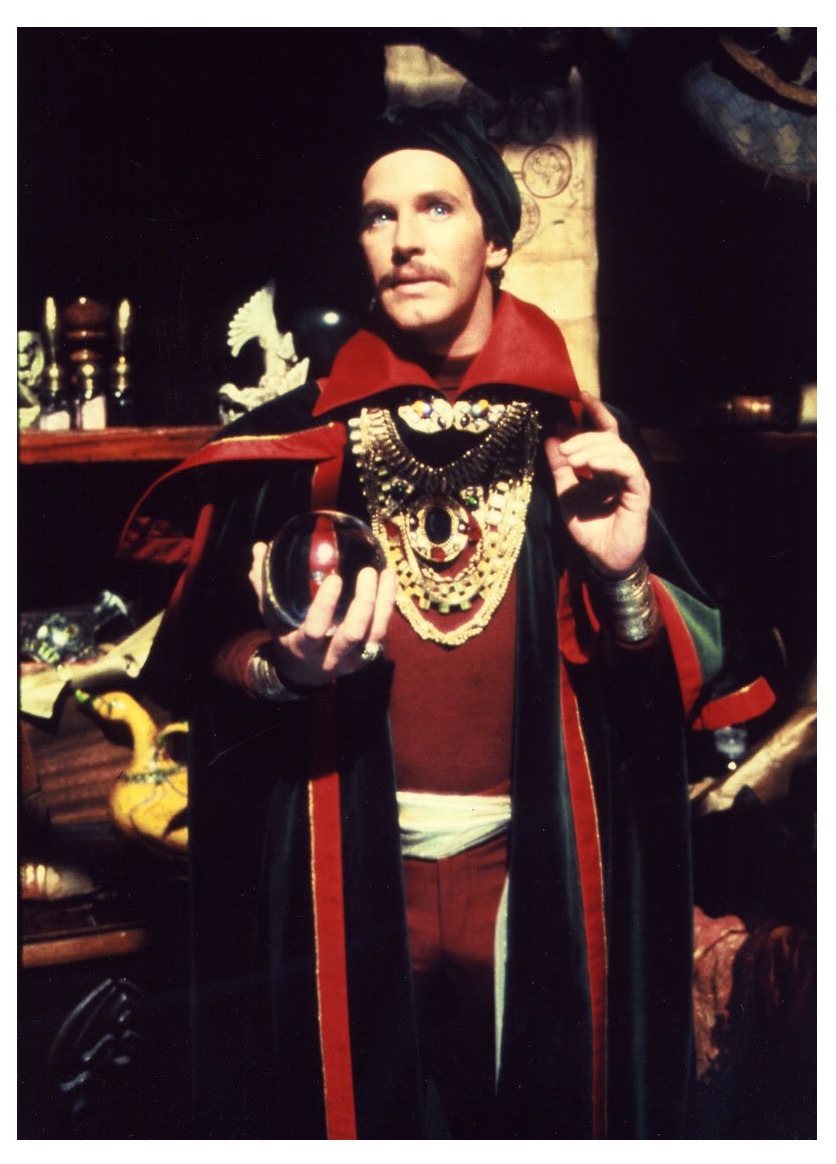
PH: It’s a feeling of sympathetic magic. Have you ever read The Golden Bough [A Study in Comparative Religion], James Frazer’s sociologic treatise? In it he talks about different behaviors of tribes. He calls it “sympathetic magic” and the idea is that if I wear a t-shirt like so-and-so then I’ll feel like so-and-so. So, you’re exactly right.
ME: Are you and Stephen Strange similar in any way?
PH: If I hadn’t been an actor I might have done pre-med. Also, I’ve always been interested in mystical things. I always liked reading about theosophy [a religious philosophy rooted in mysticism], which was a 19th century rage. When I lived in Los Angeles, I used to go The Bodhi Tree, a metaphysical bookstore. I took right to the character of Doctor Strange.
ME: It seems to me that you had a particular affinity for Stephen Strange that you didn’t have for other superheroes.
PH: I think so, surely. I thought it was a wonderful character to play, and I liked the idea that he was “Master of the Mystic Arts,” which was right up my alley. When I was 14 in Central Florida, my friends and I would visit a spiritualist camp and we went to a few séances in Orlando. Subsequently, I read about James Merrill and the Ouija board. Thoughts of parallel universes, the world in a grain of sand, a drop of water, the art, writing and music of the mystical and now quarks and neutrinos, have continued with me since.
ME: When was the last time you saw the pilot?
PH: I don’t watch myself very well. I don’t think I have seen it since the premiere party at my friend’s house. I’ve subsequently seen little clips, but that was the last time.
ME: Do you remember thinking that there were parts that could have been a little better or that you wanted to improve?
PH: I didn’t actually. I thought it was pretty good. I was pleased. I thought it all worked. I think everyone was surprised by the low-ratings. The network also had reservations about the show because it cost a lot to produce and they had other options [for less-costly shows to make]. It’s part of the disappointment of acting -- you realize that it’s not in your hands. But the person who really got hurt was [writer-director] Phil DeGuere. It was his baby. I think so much of Phil [who passed away in 2005 at the age of 60], and I miss him so much. He was an amazing talent. He was a real protean type of man. I was working and I needed some cash for the weekend. Phil said he'd get me some. We met at the gate and he handed me a check and got back into his car it was made out to: Dr. Stephen Strange. I still have that check.
ME: What are your most vivid memories of the shoot?
PH: The flying. You talk about exhilaration. And working with John Mills, Jessica Walters and Clyde [Kusatsu, the ubiquitous character actor, who played Wong, Mills’ disciple]. Everyone had a good feeling about it. Jessica pulled out all of her sultry, purring stops as Morgan Le Fay. Phil was so kind, gentle and loving. He was excited by it all and he made you excited.
ME: Was there a downside to playing a superhero?
PH: No, no. There were certainly some things that I regret being involved in but DR. STRANGE was one of the best things that I’ve ever been involved with. I really enjoyed it so much.
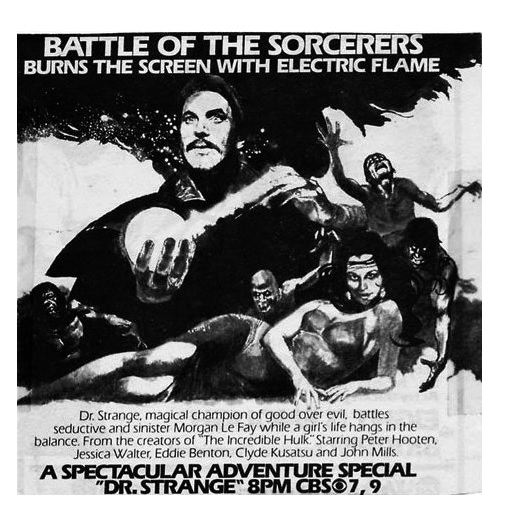
ME: Did Stan Lee ever come to the set?
PH: If he reads this, my utter respect to him. I probably met him briefly but I don’t recall. Let’s say yes and that he was charming and was just as pleased as punch. [Laughs]
ME: What are your thoughts about the new Dr. Strange?
PH: I won’t miss this new one. Benedict Cumberbatch is a brilliant actor. He’s so gifted. He’ll be superb. I’ve seen a photograph of him in character and he’s really taking the look of the comics – down to the dark eyebrows. He will be terrific. Stan Lee must be smiling double-time.
ME: When you see it – one Strange watching another - I wonder if you’ll feel a kinship.
PH: It is an affinity, certainly. It’s exciting. I’ll be happy to see it going wonderfully sailing along. I just really want it to do well. Our TV thing didn’t go. This is a chance for redemption and for Dr. Strange to become a household name among the Gods of superheroes. It’s Olympian. As I said, Cumberbatch is a terrific actor. It’s almost as if they said, “He can play Dr. Strange. Let’s bring it back for him.” I just wish the very best for him.
ME: You were also in the original 1978 INGLORIOUS BASTARDS and now Stephen Strange is returning. It must be interesting for you to see your projects revisited so many years later.
PH: It’s really weird. It’s not as though they were remarkable masterpieces. But it’s fun. Like your calling me and getting in touch, I’m remembering things that I haven’t thought about in a longtime. You’re enriching my life and I thank you.
ME: You’re very kind. As I mentioned in my letter to you, I wrote a book called How to Be a Superhero, in which I interview thirty-five actors and actresses who have played superheroes over the last seven decades. I spoke to actors who played Batman, Superman, Captain America, Spider-Man and many more. I wanted to include you in the book but I wasn’t able to track you down in time. What are you doing now?
PH: I’ve been retired for over twenty-years ago but [director] Michael Lange enticed me to do a funny part – a Jackie Gleason-style Southern Sheriff, in a sci-fi-horror film SoulEater. I play it for real but I had to milk it for some humor here and there. Michael did a good job with it.
ME: This is my silliest question. Did you already have a mustache or did you grow it for the part.
PH: I’m trying to think. I think I grew it for the part. Does it look fake?
ME: It’s definitely your ‘stache. But mustaches were more common in the Seventies and I was wondering if that was your look or if you grew one to help match the look of the comics.
PH: Well, then I definitely grew it. I’m glad I did that much. [Laughs]
ME: Has playing Dr. Strange changed you?
PH: Only that I was disappointed that it failed and I moved to New York. My life took a turn. Then I moved to Florida. Retiring here is like getting ready for your mortality.
ME: Does it come up much?
PH: Occasionally someone will ask if I know that there’s a doll of me as the Doc. Now, there’s a legacy for you!
Follow Mark Edlitz on Twitter @MarkEdlitz
